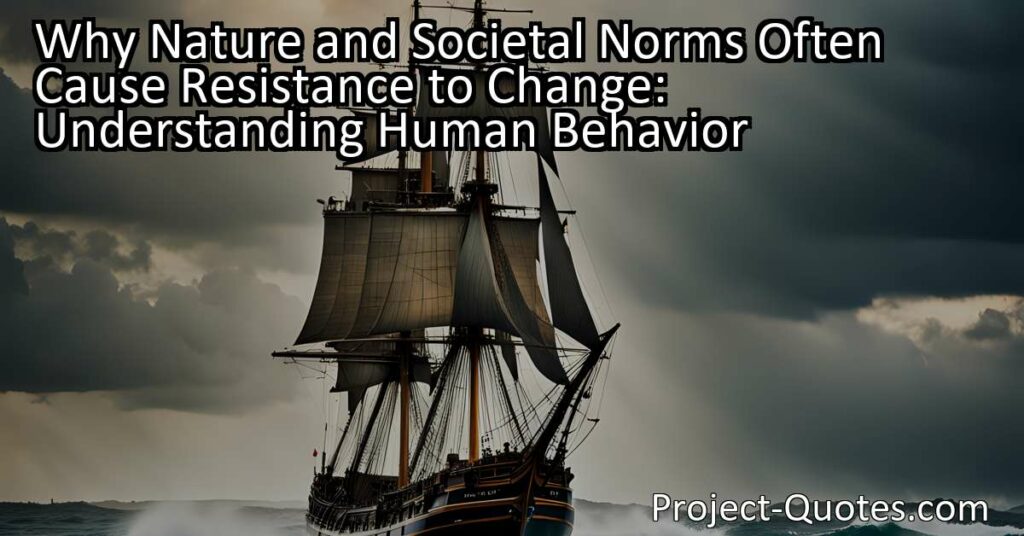Experience teaches that men are often so much governed by what they are accustomed to see and practice, that the simplest and most obvious improvements, in the most ordinary occupations, are adopted with hesitation, reluctance, and by slow gradations. Men would resist changes, so long as even a bare support could be ensured by an adherence to ancient courses, and perhaps even longer.
Hamilton, Alexander
Understanding Human Behavior: Resistance to Change Despite the apparent benefits, humans often resist change due to their comfort with familiar routines and the fear of uncertainty. This resistance is influenced by societal norms and traditions that prioritize stability and adhering to established practices. However, embracing change is crucial for personal growth, societal progress, and individual success, and by understanding and actively challenging this resistance, individuals can open themselves up to new opportunities and positive transformations.
Table of Contents
- 1 Experience teaches that men are often so much governed by what they are accustomed to see and practice, that the simplest and most obvious improvements, in the most ordinary occupations, are adopted with hesitation, reluctance, and by slow gradations. Men would resist changes, so long as even a bare support could be ensured by an adherence to ancient courses, and perhaps even longer.
- 2 Hamilton, Alexander
- 3 Meaning of Quote – Experience teaches that men are often so much governed by what they are accustomed to see and practice, that the simplest and most obvious improvements, in the most ordinary occupations, are adopted with hesitation, reluctance, and by slow gradations. Men would resist changes, so long as even a bare support could be ensured by an adherence to ancient courses, and perhaps even longer.
- 4 Freely Shareable Quote Image
- 5 Related
Meaning of Quote – Experience teaches that men are often so much governed by what they are accustomed to see and practice, that the simplest and most obvious improvements, in the most ordinary occupations, are adopted with hesitation, reluctance, and by slow gradations. Men would resist changes, so long as even a bare support could be ensured by an adherence to ancient courses, and perhaps even longer.
Change can be a daunting concept for many people. Whether it’s a new routine, a different way of doing things, or a shift in mindset, humans often find comfort in familiarity. This quote by Alexander Hamilton accurately captures this aspect of human nature, emphasizing how people are often governed by what they are accustomed to and reluctant to embrace even the simplest and most obvious improvements.
Throughout history, it has been observed that humans tend to resist change unless they are forced to do so. This resistance can be attributed to a variety of factors, including fear of the unknown, complacency, and the desire to maintain stability and security. As long as individuals can maintain a basic level of support by sticking to their familiar routines and practices, they are likely to resist any changes, no matter how beneficial they may seem.
One reason for this resistance to change can be traced back to our natural inclination to favor the status quo. Humans have a tendency to feel comfortable in their current circumstances, even if those circumstances are not ideal. This innate resistance stems from the fear of uncertainty and the potential for negative outcomes. When presented with the opportunity to make a change, people often hesitate, questioning whether the potential benefits outweigh the potential risks and disruptions.
Moreover, the influence of societal norms and traditions plays a significant role in people’s resistance to change. These deeply ingrained beliefs and practices shape individuals’ perspectives and dictate their actions. The adherence to ancient courses is driven by the comfort and stability that tradition provides. Challenging these established norms can seem unnecessary and risky, especially when alternative methods are untested or unfamiliar.
Additionally, the pace at which change occurs also influences people’s resistance to it. Gradual, slow-paced changes are more likely to be accepted as they allow individuals to adapt gradually and feel more in control. Drastic changes that occur suddenly and disrupt the familiar flow of life are often met with hesitation and reluctance. It takes time for people to adjust and embrace new ways of thinking and doing things.
However, it is important to acknowledge that change, even if initially resisted, is often vital for personal growth, societal progress, and individual success. While people may hold onto the familiar, embracing change can open up new opportunities for innovation, improvement, and advancement.
For instance, imagine a scenario where a person has always followed a specific routine as part of their daily life. They may resist suggestions to make small changes, such as waking up half an hour earlier or incorporating exercise into their routine. Initially, it may seem unnecessary and inconvenient to alter their established pattern. However, once they take the plunge and make those changes, they may discover that waking up earlier allows them to start their day feeling refreshed and energized. Incorporating exercise leads to improved physical and mental well-being. These simple changes bring about positive outcomes that were initially overlooked due to resistance to change.
On a larger scale, societal progress often depends on individuals challenging traditional practices and embracing new ideas. Throughout history, innovations and advancements have been made when individuals were willing to challenge the status quo and adopt new approaches. From the development of advanced technology to the implementation of groundbreaking social reforms, change has brought about positive transformations.
It is essential to foster a mindset that embraces change and encourages continuous growth and improvement. This can be achieved by cultivating an open mind, being receptive to new ideas, and recognizing that change is an inherent part of life. By understanding that resistance to change is often rooted in fear and the desire for stability, individuals can actively work towards overcoming those barriers and embracing change.
Creating an environment that supports and encourages change is also crucial. This can be done through education, open dialogue, and the sharing of success stories that highlight the benefits of embracing new approaches. By providing the necessary resources and support, individuals can feel empowered to step outside of their comfort zones and explore different possibilities.
In conclusion, human nature and societal norms often contribute to people’s resistance to change, even when it may seem obvious and beneficial. However, it is crucial to recognize that embracing change is necessary for personal growth, societal progress, and individual success. By understanding the reasons behind this resistance and actively working to overcome it, individuals can open themselves up to new opportunities, innovations, and positive transformations. So, let us strive to challenge our comfort zones, question the status quo, and embrace change for the betterment of ourselves and society as a whole.
I hope this quote inspired image brings you hope and peace. Share it with someone who needs it today!


